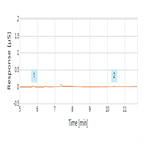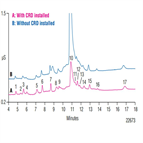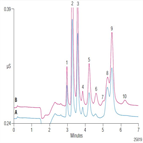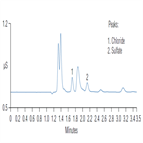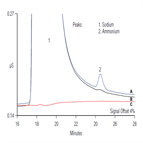Find methods for your needs
Refine by Feature
Displaying 1-5 of 8 results for Tag: Reagent-Free IC
Trace Anion Analysis in Ultrapure Water Using an Electrolytic Water Purifier with a Compact Ion Chromatography System: Water Blank
Instrument Type: ICDeterminations of trace anions in ultrapure water are important to the electronics industry. In this record, determinations of ng/L (ppt) anions using large volume concentration are made possible by the Electrolytic Water Purifier(EWP) and AutoPrep modules. Calibration standards are prepared using the AutoPrep large and small loops and EWP-purified water diluent, thereby increasing sensitivity by eliminating sources of contamination. The trace anions are separated on an IonPac AS17-C column designed to improve low level sulfate determinations using a Dionex Integrion compact IC system.
TN62: Reducing Carbonate Interference in Anion Determinations with the Carbonate Removal Device (CRD): Trace Anions
Instrument Type: ICCarbonate can interfere with accurate quantification of adjoining anions, such as sulfate. Here we show the efficient removal of the carbonate peak from a trace analysis water sample using the Dionex CRD 200 device. In this example, a large volume (1000 uL) of water spiked with < 4 ug/L concentration of 17 anions is directly analyzed.
AN222: Determination of Parts-Per-Trillion Concentrations of Strontium by Pre-Concentration with Ion Chromatography and Suppressed Conductivity Detection
Instrument Type: ICRadioactive isotopes of strontium (90Sr and 89Sr isotopes) are byproducts of nuclear power plant reactions. 90Sr monitoring is needed because 90Sr can displace calcium in bones and teeth, resulting in long term exposure and subsequent increased cancer risk. Ion-exchange chromatography can be used to focus and isolate 90Sr from other isotopes that interfere with accurate scintillation determinations. Here ng/L of non-radioactive Sr as a retention time marker for 90Sr is pre-concentrated, then separated on an IonPac CS12A column, and detected by suppressed conductivity.
AN1075: Ion Chromatography Assay for Chloride and Sulfate in Adenosine
Instrument Type: ICAdenosine is produced by the condensation of ribose and adenine biochemically or by fermentation. Anions such as chloride and sulfate are possible impurities in adenosine preparations and the U.S. Pharmacopeia (USP) adenosine monograph describes turbidity-based assays to determine the amount of chloride and sulfate in adenosine which are subjective, use toxic chemicals, and generate hazardous waste. This application is a fast ion chromatography (IC)-based method that can meet the assay requirements and replace the USP adenosine monograph’s existing turbidity-based assays.
AN1073: Determination of Ammonia in Sodium Bicarbonate
Instrument Type: ICThis study describes an ion chromatography (IC)-based method for the determination of ammonia (as ammonium) in sodium bicarbonate. The method performance characteristics—linearity, precision, accuracy, ruggedness, and the limits of detection (LODs) and quantitation (LOQs)—were measured according to the requirements described in the USP General Chapter <1225> guidelines. The automation features such as the electrolytically generated mobile phase and self-regenerating suppressor contribute to the robustness and sensitivity of this method.

